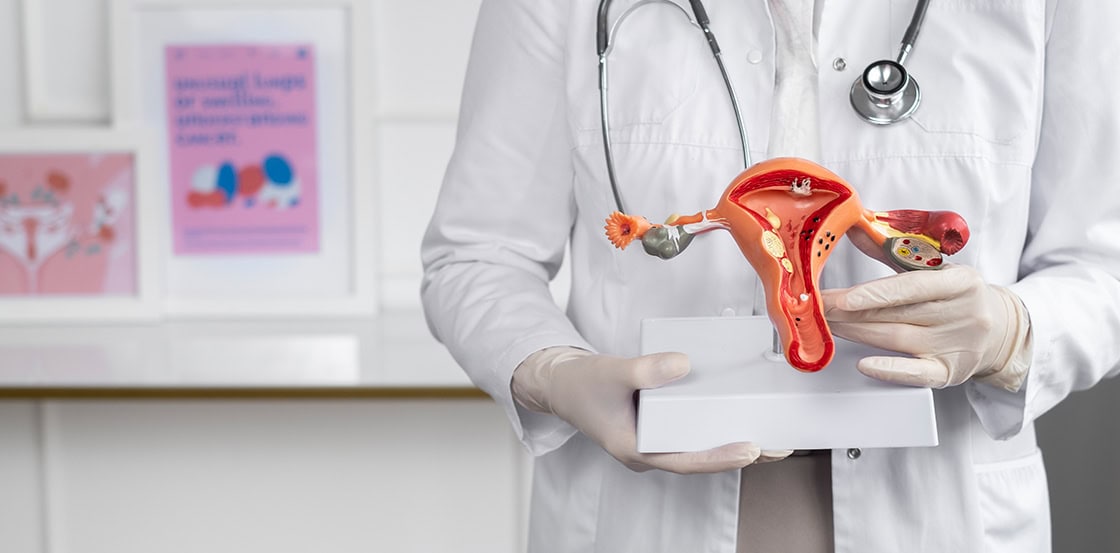Post link copied to clipboard!

Are you looking for effective fibroid treatment in London? Look no further!
Fibroids are non-cancerous (benign) growths from the uterus’s muscular wall. Initially tiny, they can gradually expand and cause symptoms like heavy periods, bloating, and pressure, leading to frequent urination and back pain.
While the exact cause is unknown, fibroids are hormone-dependent tumours that grow in response to oestrogen. They can appear inside the uterus cavity, within its wall, on its outer surface, or attached by a stem-like structure.
Fibroids most commonly occur in women aged 30-40, though they can develop at any age. Studies suggest that family history and early onset of menstruation are interconnected. African-American women and Caucasians are more frequently affected.
Many fibroids remain symptomless. Gynaecologists often discover during a routine pelvic ultrasound scan at a gynaecological check-up. When symptoms appear, they may include:
If you experience any symptoms mentioned above, a private gynaecologist in London can help diagnose and manage your condition more effectively.
Fibroids may cause noticeable symptoms. During a routine pelvic ultrasound, an expert gynaecologist in London will otherwise discover it. If there is a clinical suspicion of fibroids, doctors can confirm the diagnosis using the following methods:
If the gynaecologist suspects fibroids, they will offer an effective fibroid treatment in London and provide the necessary guidance to manage your condition.
Uterine fibroids, a common condition, affect up to 80 per cent of women of reproductive age.
While many women with fibroids experience no symptoms, others suffer from significant issues such as abnormal uterine bleeding, pelvic pain, and bulk symptoms, including bladder and bowel dysfunction, which can severely impact their lives.
Conservative management is a popular choice among women with fibroids. Hormonal treatments, such as contraceptive pills, levonorgestrel intrauterine devices, and gonadotrophin-releasing hormone analogues, can alleviate heavy menstrual bleeding and anaemia. Additionally, uterine artery embolisation offers a non-surgical and uterine-sparing option. However, these treatments may not be suitable for women who wish to conceive in the future.
For women who desire future fertility, myomectomy is the standard treatment. Unfortunately, by the time symptoms prompt women to seek care, they may have numerous and large fibroids, leading to significant blood loss, surgical scarring, and an increased likelihood of requiring a caesarean delivery in the future.
Treating uterine fibroids in women who wish to conceive poses a challenge. The goal is to improve symptoms while preserving fertility and enhancing reproductive outcomes. In recent years, radiofrequency ablation (RFA) has emerged as a less invasive, uterine-sparing alternative that could offer this balance.
Endoscopic treatment uses minimally invasive surgery, often referred to as day surgery, to remove specific fibroids. This approach is suitable based on the fibroids’ size, number, and location. Its main benefits include a shorter hospital stay and faster recovery.
In contrast, conventional open surgery is better suited for large or numerous fibroids, especially when attempting removal via keyhole surgery is risky. This method typically requires a hospital stay of 1-2 nights and involves making an incision along the bikini line. It aims to remove all fibroids, including smaller ones, to minimise the risk of any remaining fibroids growing back and necessitating additional surgery.
Are fibroid symptoms bothering you? Book an appointment with Top Gynaecologists Clinic today and take the first step towards relief!
The fibroid treatment in London will depend on the underlying problems. If the primary issue is difficulty in conceiving and imaging tests suggest fibroids as a potential cause, surgical removal is often the recommended approach. If fibroids are found incidentally and are asymptomatic, treatment may not be necessary. However, if they are pressing on the urinary bladder, causing back pain, or leading to significant abdominal enlargement, there are treatments available that can help reduce their size.
Q1) Can fertility medicine cause uterine fibroids?
Fertility medications themselves do not cause uterine fibroids. Prolonged exposure to oestrogen may contribute to fibroid development, but fertility treatments are typically short-term and intermittent.
Q2) What surgeries can treat fibroids?
Myomectomy involves removing fibroids while preserving the uterus. Doctors perform this procedure via laparoscopy, hysteroscopy, or a traditional abdominal incision.
Hysterectomy involves removing the uterus along with the fibroids. The surgeon may or may not remove the ovaries and can perform the surgery laparoscopically, abdominally, or vaginally. A gynaecologist usually considers a hysterectomy when other treatments have failed, the fibroids are too large, or the uterus no longer needs to support childbearing.
Other treatments include Uterine Artery Embolisation (UAE) and High-Intensity Focused Ultrasound (HIFU).
Q3) Can uterine fibroids affect fertility?
Yes, fibroids can impact fertility, though this is rare. They may interfere with the uterine cavity or fallopian tubes, making conception more difficult. It usually occurs only with large fibroids.
Q4) Can medications treat fibroids?
Medications can help alleviate heavy bleeding and pelvic pain caused by fibroids, but they do not stop fibroid growth or make them disappear. Options include painkillers like Paracetamol and Brufen, oral contraceptive pills, progesterone pills or IUCD, and GnRH agonists.
Q5) How are uterine fibroids diagnosed?
Doctors typically diagnose fibroids when symptoms such as heavy periods, fertility issues, or pressure from the fibroids arise. They can also be found incidentally during an abdominal or pelvic ultrasound or other imaging tests.